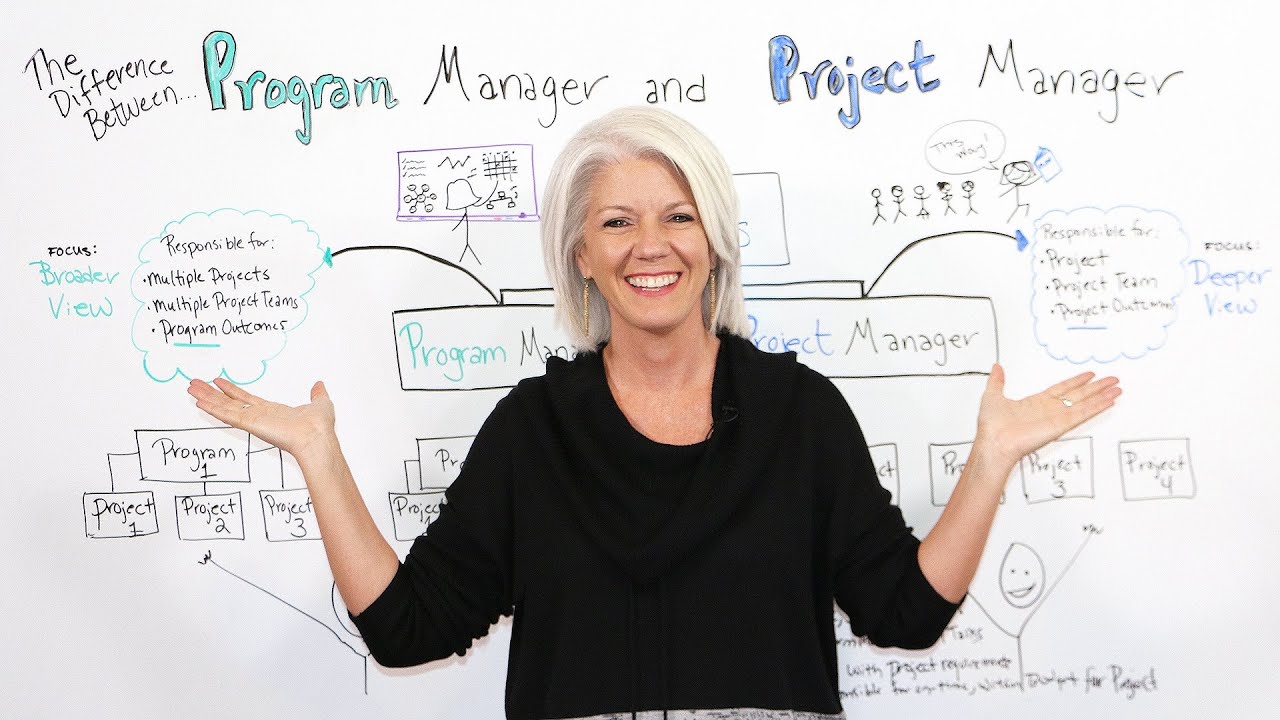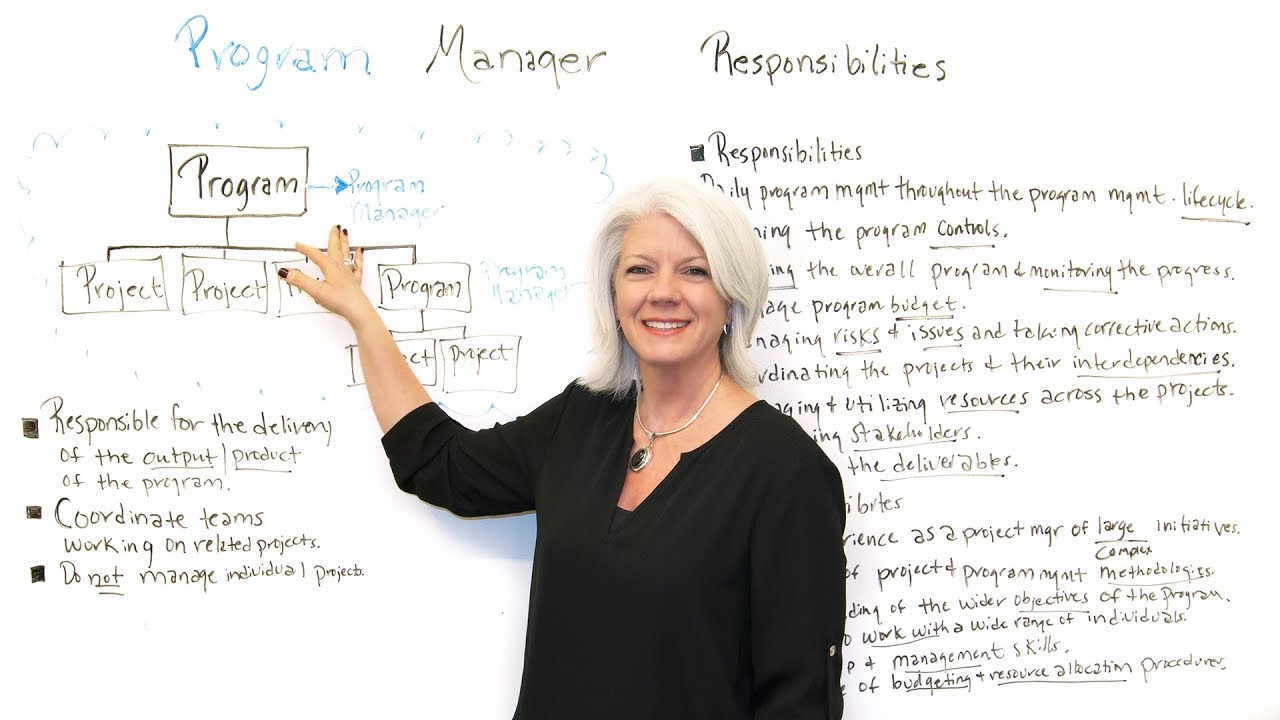Program management is a complex and challenging careerpath that requires individuals to oversee multiple projects within an organization. Program managers must be skilled in project management, technical expertise, and leadership, as they are responsible for coordinating and aligning work with the organization's goals and objectives. In this article, we will explore is program manager career path,including the responsibilities, salary, and how tobecome a program manager.
What Is Program Management?

What is Program Management?
Program management is the process of managing multiple related projects that are often complex and have a common objective. It involves coordinating various project activities and resources, as well as monitoring the progress of the programs and ensuring that they are aligned with the organization's overall goals and objectives.
Program management typically involves overseeing a team of project managers and working closely with stakeholders to ensure that all projects are completed on time, within budget, and to the desired quality standards. The primary goal of program management is to ensure that all projects within a program are integrated and coordinated so that they collectively deliver the desired benefits and outcomes for the organization.
Why Choose The Program Management Career?
There are several reasons why one may choose to pursue a career in program management:
- Leadership opportunities -Program management is a leadership role that involves overseeing and coordinating the work of multiple projects and teams. Program managers have the opportunity to lead and motivate teams of project managers, subject matter experts, and other stakeholders, and to make decisions that have a significant impact on the organization's success.
- Challenging and dynamic work -Program management involves overseeing complex, interdependent projects that often require creative problem-solving and strategic thinking. This work can be challenging but also rewarding, as program managers have the opportunity to make a tangible difference in their organization's success.
- Career growth and advancement -Program management is a senior-level position that offers opportunities for career growth and advancement. With experience and expertise, program managers can progress to higher-level positions within their organization, such as director or vice president.
- Variety of industries and sectors -Program management is a versatile role that is found in many industries and sectors, including IT, healthcare, finance, and government. This provides program managers with a range of options when it comes to choosing their area of specialization.
- High demand and competitive salary -Program management is a high-demand role that offers competitive salaries and benefits. According to Glassdoor, the average salary for a program manager in the United States is around $106,000 per year.
Who Works In Program Management?
Program management typically involves a team of professionals who work together to oversee multiple related projects. Here are some of the key roles and responsibilities involved in program management:
- Program manager -The program manager is responsible for overseeing the program's overall success, coordinating various project activities and resources, and ensuring that all projects are aligned with the organization's goals and objectives.
- Project manager -Project managers are responsible for managing individual projects within the program. They work closely with the program manager to ensure that all project work is coordinated and aligned with the program's goals.
- Subject matter experts -Subject matter experts (SMEs) provide expertise in specific areas related to the program's goals, such as technical or functional expertise. They work closely with the program and project managers to ensure that project work is aligned with the program's objectives.
- Stakeholders -Stakeholders are individuals or groups who have an interest in the program's success, such as customers, vendors, and internal departments. Program managers work closely with stakeholders to ensure that their needs and expectations are met.
- Program office staff:= -Program office staff provides administrative support to the program and project managers, such as scheduling meetings, preparing reports, and managing program documentation.
Can A Project Manager Be A Program Manager?
A project manager can become a program manager. In fact, many program managers start their careers as project managers and work their way up to program management roles.
Program management involves overseeing multiple related projects that are often complex and have a common objective. It requires a broader perspective and strategic thinking, as well as strong leadership and communication skills. Project managers who have experience managing multiple projects and have demonstrated the ability to coordinate project work and resources may be well-suited for program management roles.
However, it's important to note that program management is a different role from project management, with its own set of challenges and responsibilities. Program managers need to be able to see the big picture, understand the interdependencies between projects, and ensure that all projects within the program are aligned with the organization's goals and objectives. They also need to be skilled at managing stakeholder relationships, communicating effectively with executives and other stakeholders, and managing program risks and issues.
Project managers can transition into program management roles with the right skills, experience, and mindset, but it's important to recognize that the two roles have distinct responsibilities and require different skills and competencies.
Program Manager Vs. Project Manager

The Difference Between a Program Manager and a Project Manager
Program managers and project managers are both involved in managing projects, but they have different roles and responsibilities.
Program Manager
- Oversees multiple related projects that are often complex and have a common objective
- Develops and implement a strategic plan for the program
- Coordinates project activities and resources to ensure they are aligned with the organization's goals and objectives
- Manages stakeholder relationships, communicates with executives, and ensures that program risks and issues are identified and managed effectively
- Provides leadership and direction to the project managers and teams working on the program
Project Manager
- Responsible for managing an individual project, including developing a project plan, managing project scope, schedule, and budget, and ensuring that project deliverables are completed to the desired quality standards
- Coordinates project work and resources, communicates with stakeholders and manages project risks and issues
- Manages project teams and provides direction and leadership to project team members
- Works closely with the program manager to ensure that the project is aligned with the program's goals and objectives
Program managers are responsible for overseeing multiple related projects, ensuring that they are coordinated and aligned with the organization's goals, while project managers are responsible for managing individual projects and ensuring that project work is completed on time, within budget, and to the desired quality standards. Both roles require strong leadership, communication, and problem-solving skills, but they differ in their scope and focus.
Responsibilities Of A Program Manager

Program Manager Responsibilities - Project Management Training
The responsibilities of a program manager can vary depending on the organization and the specific program they are responsible for. However, here are some common responsibilities that a program manager may have:
- Developing and implementing a program plan -The program manager is responsible for developing a program plan that outlines the goals, objectives, scope, and deliverables of the program. They work with stakeholders to identify program requirements and develop a plan that meets their needs.
- Coordinating project activities and resources -Program managers oversee the work of multiple project teams and ensure that project activities and resources are coordinated to meet the program's objectives. They may also manage program budgets, schedules, and resource allocation.
- Managing program risks and issues -Program managers identify, assess, and manage program risks and issues to ensure that the program stays on track and meets its objectives. They develop risk mitigation strategies and contingency plans to minimize the impact of potential issues.
- Communicating with stakeholders -Program managers communicate regularly with stakeholders to keep them informed about the program's progress and address any concerns or issues that arise. They may also prepare program reports and presentations for senior executives and other stakeholders.
- Providing leadership and direction -Program managers provide leadership and direction to project teams and ensure that they are aligned with the program's objectives. They may also mentor and coach project managers and other team members to help them develop their skills and achieve their goals.
- Evaluating program performance -Program managers evaluate program performance against established goals and objectives and make adjustments as needed to ensure that the program is successful. They may also conduct program reviews to identify areas for improvement and implement changes to enhance program effectiveness.
Program Manager Salary
Program manager salaries can vary widely depending on several factors, such as the industry, the location, the level of experience, and the size and complexity of the program being managed. Here are some estimates of program manager salaries based on data from reputable sources:
- According to Glassdoor, the average base salary for a program manager in the United States is around $107,000 per year, with salaries ranging from $71,000 to $155,000 depending on location, industry, and experience.
- PayScale reports that the median salary for a program manager is around $93,000 per year, with salaries ranging from $60,000 to $147,000 depending on factors such as experience, skills, and industry.
- According to the Bureau of Labor Statistics (BLS), the median annual wage for computer and information systems managers, which includes program managers, was $151,150 as of May 2020. However, it's important to note that this figure may not reflect the specific salaries of program managers in other industries.
How To Become A Program Manager?
To become a program manager, you typically need a combination of education, experience, and skills. Here are the steps you can take to become a program manager:
- Get a bachelor's degree -Most program managers have a bachelor's degree in a relevant field such as businessadministration, engineering, computer science, or a related field. A degree in project management, program management, or a related discipline can also be helpful.
- Gain experience in project management -Program management is a senior-level role that requires significant experience in project management. To gain experience, you can start by working as a project coordinator or project manager and gradually take on more responsibilities as you gain experience.
- Develop your skills -Program managers need a variety of skills, including leadership, communication, strategic thinking, risk management, and problem-solving. To develop these skills, you can take courses or certifications in program management, project management, leadership, or other relevant areas.
- Earn a certification -While not always required, earning a program management certification can help demonstrate your expertise and make you a more competitive candidate. Some of the most recognized certifications for program managers include the Program Management Professional (PgMP) certification from the Project Management Institute (PMI) and the Managing Successful Programs (MSP) certification from Axelos.
- Network and build relationships -Building a strong professional network can help you learn about program management job opportunities and connect with others in the industry. Attend professional events, join industry organizations, and connect with other professionals on social mediaplatforms like LinkedIn.
Becoming a program manager requires a combination of education, experience, and skills. By developing your skills and gaining experience in project management, earning a certification, and building a strong network, you can position yourself for a successful career in program management.
What To Do People Working As Program Manager?
As a program manager, you are responsible for overseeing a portfolio of projects and ensuring that they are delivered on time, within budget, and to the satisfaction of stakeholders. Here are some of the key activities and responsibilities that people working as program managers typically do:
- Define the program scope and objectives -Program managers work with stakeholders to define the scope and objectives of the program, including the goals, timelines, budget, and deliverables.
- Develop a program plan -Once the scope and objectives are defined, program managers create a program plan that outlines the activities, resources, and timelines needed to deliver the program.
- Identify and manage risks -Program managers are responsible for identifying potential risks to the program and developing strategies to mitigate them. They also monitor the program's progress and adjust the plan as needed to address emerging risks.
- Manage program resources -Program managers are responsible for managing the program's budget, staff, and other resources. They ensure that resources are allocated effectively and efficiently to support the program's goals.
- Coordinate with project managers -Program managers work closely with project managers to ensure that individual projects are aligned with the program's goals and objectives. They provide guidance, support, and oversight to project managers to ensure that projects are delivered successfully.
- Communicate with stakeholders -Program managers are responsible for communicating with stakeholders about the program's progress, risks, and outcomes. They keep stakeholders informed through regular reports, meetings, and other communication channels.
- Monitor and evaluate program performance -Program managers monitor the program's performance to ensure that it is meeting its goals and objectives. They collect data and analyze program performance to identify areas for improvement and make recommendations for future program activities.
People Also Ask
What Does A Program Manager Do?
A program manager is responsible for overseeing multiple projects that are interdependent and have a common objective. They work closely with project managers and other stakeholders to ensure that all work is coordinated and aligned with the organization's goals.
What Skills Are Needed To Be A Program Manager?
To be a successful program manager, you need a diverse range of skills. Some of the most important ones include leadership, project management, technical expertise, and businessacumen.
What Is The Salary Of A Program Manager?
The salary of a program manager varies depending on factors such as location, experience, and industry. According to Glassdoor, the average salary for a program manager in the United States is around $106,000 per year.
Conclusion
The program manager career path is an excellent choice for individuals who enjoy leading and coordinating complex programs. Program managers require a diverse range of skills, including leadership, project management, technical expertise, and business acumen.
With experience and expertise, program managers can progress through senior-level positions, overseeing larger and more complex programs within an organization. Education and certifications, such as the PMP, can also enhance a program manager's career prospects.
